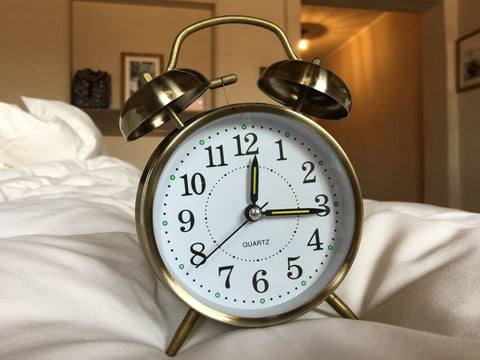With the current global pandemic continuing, many things our out of our control.
We must choose to live in the present moment and focus on important aspects of our health that we can control - nutrition, exercise, and sleep.
Good sleep quality not only reduces risk for developing chronic diseases like cardiovascular disease and diabetes, but it is also closely linked to both physical and mental health.

Today we are going to share with you some tips to improving sleep quality through proper nutrient intake and exercise.
Dietary intake has been seen to play a significant role in regulating an individual’s overall sleep cycle and quality.
There is mixed research on what specific foods we should be consuming to help improve sleep quality, but there is evidence stating that the types of macronutrients consumed can play a crucial role in sleep quality.
The three main macronutrients in the diet include carbohydrates, fat, and protein.
Carbohydrates
In a recent prospective study, food with a high glycemic index such as added sugars, starches, and non-whole/refined grain carbohydrates were shown to increase insomnia. However, a diet higher in healthy dietary fiber found in fresh fruits, vegetables, whole-grains, beans, and legumes was found to have a significant positive impact on sleep quality.
Fats
Research is limited on whether the type of fat consumed, unsaturated vs saturated fat, can impact sleep quality. Current evidence suggests that consuming more saturated fat such as dairy products and animal meats can shorten duration of sleep and wellness compared with unsaturated fats.
Specifically, omega 3 polyunsaturated fatty acids help to reduce inflammation in the body; a direct deficiency in omega-3 polyunsaturated fatty acids has been proven to disturb nocturnal sleep through affecting the melatonin rhythm and circadian clock and function.
Protein
Amino Acids are the building blocks of protein. Supplementation with GABA, an amino acid that works as a neurotransmitter in the brain has been proven to increase sleep efficacy.
Additionally, lean proteins and plant-based proteins may be more beneficial for sleep-quality long-term. A Mediterranean diet pattern emphasizes proteins such as salmon, turkey, chicken, beans, and lentils. In a study with postmenopausal women in the United States, increasing legume, fruit, and vegetable intake through a Mediterranean style diet was associated with higher sleep efficiency and fewer sleep disturbances.
While proper dietary intake is important to help fuel our bodies with essential vitamins and minerals, exercise has also been used a natural treatment for better sleep and to control overall energy balance.
Aerobic exercise
Aerobic exercise has been used as strategy to increase sleep quality in older adults. MICT (Moderate intensity continuous training) with the addition of stretching and flexibility has been seen to have an even greater effect on sleep outcomes than aerobic exercise alone. However, HIIT workouts have not proven to be beneficial. These workouts elicit heightened physiological arousal and muscle soreness which can counteract the potential beneficial effects of exercise on sleep.
Remember to eat healthy when you can and get some movement in every day, but also choose to eat what makes you feel good and move in ways that bring you joy. In the end if we aren’t happy with our lifestyles, we won’t be able to live to our best potentials and rise above any challenge that may come our way.
References
1) Zhao, M., Tuo, H., Wang, S., & Zhao, L. (2020). The Effects of Dietary Nutrition on Sleep and Sleep Disorders. Mediators of Inflammation, 2020, 1-7. doi:10.1155/2020/3142874
2) Zuraikat, F. M., Makarem, N., St-Onge, M., Xi, H., Akkapeddi, A., & Aggarwal, B. (2020). A Mediterranean Dietary Pattern Predicts Better Sleep Quality in US Women from the American Heart Association Go Red for Women Strategically Focused Research Network. Nutrients, 12(9), 2830. doi:10.3390/nu12092830
3) Saidi, O., Rochette, E., Bovet, M., Merlin, E., & Duché, P. (2020). Acute intense exercise improves sleep and decreases next morning consumption of energy‐dense food in adolescent girls with obesity and evening chronotype. Pediatric Obesity, 15(6). doi:10.1111/ijpo.12613
4) Altena, E., Baglioni, C., Espie, C. A., Ellis, J., Gavriloff, D., Holzinger, B., . . . Riemann, D. (2020). Dealing with sleep problems during home confinement due to the COVID‐19 outbreak: Practical recommendations from a task force of the European CBT‐I Academy. Journal of Sleep Research, 29(4). doi:10.1111/jsr.13052
5) Cai, Y., Cao, P., Zhang, S., & Wan, Q. (2020). The effectiveness of different exercise modalities on sleep quality: A systematic review and network meta-analysis. doi:10.37766/inplasy2020.5.0096
6) Bullock, A., Kovacevic, A., Kuhn, T., & Heisz, J. J. (2020). Optimizing Sleep in Older Adults: Where Does High-Intensity Interval Training Fit? Frontiers in Psychology, 11. doi:10.3389/fpsyg.2020.576316
Author: Karli McCarthy
Cal Poly, SLO Nutrition Student
@kale_n_it_karli




